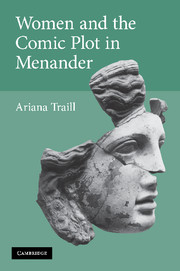Chapter 4 - Informing the audience
Published online by Cambridge University Press: 22 September 2009
Summary
The preceding chapters explored how and why characters in Menander make fundamental mistakes about those closest to them. Much of the genre's appeal lies in watching people “wander in ignorance,” as Chance says at the beginning of the Aspis, and for this, an audience needs to know the truth. Status questions are easily resolved simply by situating the disputed individual within the correct kinship group. In these cases, Menander generally uses the prologue to set us straight. For example, “Misapprehension” in the Perikeiromenē explains Glykera's relationship to Moschion, Moschion in the Samia confesses that the baby is his, Chance explains that Kleostratos is not really dead, and an unidentified prologue speaker in the Phasma tells us that the apparition is a real girl. It was not so easy, however, to enlighten an audience about more complex aspects of identity such as personality and moral character, particularly in ambiguous cases. Chance succinctly types Smikrines as “rotten,” πονηρ⋯ς (140), and Chairestratos as “good,” χρηστ⋯ς (125), but most characters fall in between. The debate over whether Menander created a “good hetaira” reflects the moral complexity of his low-status women, many of whom engage in problematic behaviors – good by one standard, bad by another.
This chapter focuses on techniques Menander uses to win sympathy for women of compromised status who are the objects of mistakes about their moral character (Glykera, Krateia, and Chrysis), in order to persuade us that they deserve the social elevation they receive at the end of the play.
- Type
- Chapter
- Information
- Women and the Comic Plot in Menander , pp. 130 - 176Publisher: Cambridge University PressPrint publication year: 2008



